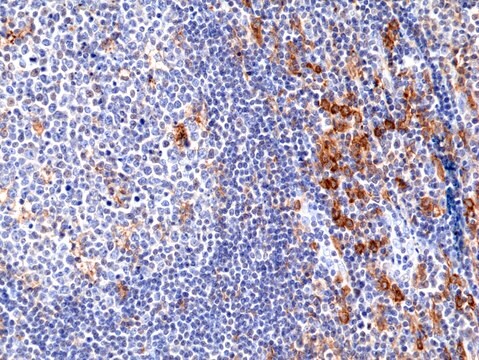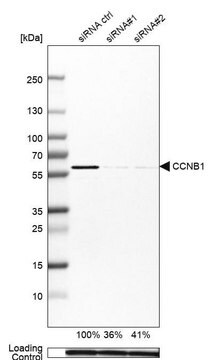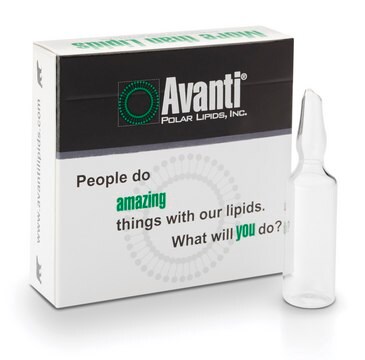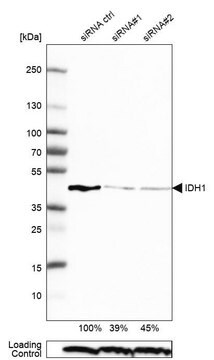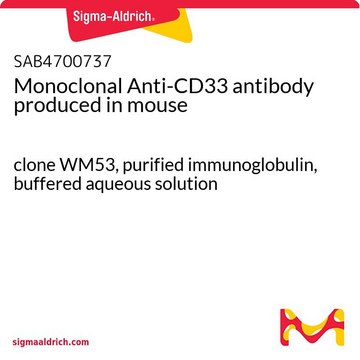SAB4700152
Monoclonal Anti-CD33 antibody produced in mouse
clone HIM3-4, purified immunoglobulin, buffered aqueous solution
Anmeldenzur Ansicht organisationsspezifischer und vertraglich vereinbarter Preise
Alle Fotos(1)
About This Item
UNSPSC-Code:
12352203
NACRES:
NA.41
Konjugat:
unconjugated
application:
FACS
Klon:
HIM3-4, monoclonal
Speziesreaktivität:
human, nonhuman primates
citations:
7
Methode(n):
flow cytometry: suitable
Empfohlene Produkte
Biologische Quelle
mouse
Qualitätsniveau
Konjugat
unconjugated
Antikörperform
purified immunoglobulin
Antikörper-Produkttyp
primary antibodies
Klon
HIM3-4, monoclonal
Form
buffered aqueous solution
Speziesreaktivität
human, nonhuman primates
Konzentration
1 mg/mL
Methode(n)
flow cytometry: suitable
Isotyp
IgG1
NCBI-Hinterlegungsnummer
UniProt-Hinterlegungsnummer
Versandbedingung
wet ice
Lagertemp.
2-8°C
Posttranslationale Modifikation Target
unmodified
Angaben zum Gen
human ... CD33(945)
Verwandte Kategorien
Allgemeine Beschreibung
The antibody HIM3-4 reacts with CD33, a 67 kDa type I transmembrane glycoprotein (immunoglobulin superfamily) expressed on myeloid progenitors, monocytes, granulocytes, dendritic cells and mast cells; it is absent on platelets, lymphocytes, erythrocytes and hematopoietic stem cells.
Immunogen
NFMY-9s human cell line
Anwendung
The reagent is designed for Flow Cytometry analysis. Suggested working dilution for Flow Cytometry is 2-8 μg/mL of sample. Indicated dilution is recommended starting point for use of this product. Working concentrations should be determined by the investigator.
Leistungsmerkmale und Vorteile
Evaluate our antibodies with complete peace of mind. If the antibody does not perform in your application, we will issue a full credit or replacement antibody. Learn more.
Physikalische Form
Solution in phosphate buffered saline, pH 7.4, with 15 mM sodium azide.
Haftungsausschluss
Unless otherwise stated in our catalog or other company documentation accompanying the product(s), our products are intended for research use only and are not to be used for any other purpose, which includes but is not limited to, unauthorized commercial uses, in vitro diagnostic uses, ex vivo or in vivo therapeutic uses or any type of consumption or application to humans or animals.
Sie haben nicht das passende Produkt gefunden?
Probieren Sie unser Produkt-Auswahlhilfe. aus.
Lagerklassenschlüssel
10 - Combustible liquids
Flammpunkt (°F)
Not applicable
Flammpunkt (°C)
Not applicable
Hier finden Sie alle aktuellen Versionen:
Besitzen Sie dieses Produkt bereits?
In der Dokumentenbibliothek finden Sie die Dokumentation zu den Produkten, die Sie kürzlich erworben haben.
I Pizzitola et al.
Leukemia, 28(8), 1596-1605 (2014-02-08)
As significant numbers of acute myeloid leukemia (AML) patients are still refractory to conventional therapies or experience relapse, immunotherapy using T cells expressing chimeric antigen receptors (CARs) might represent a valid treatment option. AML cells frequently overexpress the myeloid antigens
Monica Killig et al.
European journal of immunology, 44(9), 2822-2834 (2014-06-05)
Haploidentical stem cell transplantation (haploSCT) offers an alternative treatment option for advanced leukemia patients lacking a HLA-compatible donor. Transfer of NK cells represents a promising therapeutic option in combination with SCT, as NK cells can promote graft versus leukemia with
Yongjun Sui et al.
The Journal of clinical investigation, 124(6), 2538-2549 (2014-05-20)
Vaccines are largely evaluated for their ability to promote adaptive immunity, with little focus on the induction of negative immune regulators. Adjuvants facilitate and enhance vaccine-induced immune responses and have been explored for mediating protection against HIV. Using a regimen
Fanhang Meng et al.
Inflammation, 37(5), 1799-1805 (2014-05-03)
Myeloid-derived suppressor cells (MDSCs) are negative regulators of the immune response and are in part responsible for the inhibition of the T cell-mediated immune response. A recent paper indicated that MDSCs were involved in prolonged allograft survival in animal models
Tsung-Han Wu et al.
Cellular immunology, 290(1), 107-115 (2014-06-25)
We developed an in vitro model to evaluate the effect of products secreted from different colorectal cancer (CRC) cell lines on specific phenotypic switching and functional alterations in THP-1 cells. We co-cultured the human monocytic cell line, THP-1, or phorbol-12-myristate-13-acetate
Unser Team von Wissenschaftlern verfügt über Erfahrung in allen Forschungsbereichen einschließlich Life Science, Materialwissenschaften, chemischer Synthese, Chromatographie, Analytik und vielen mehr..
Setzen Sie sich mit dem technischen Dienst in Verbindung.